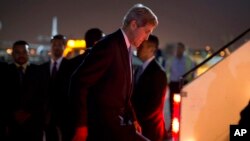AMMAN —
U.S. Secretary of State John Kerry is going to Geneva Friday to meet with Iranian Foreign Minister Mohammad Javad Zarif on the sidelines of talks over Iran's nuclear program. The surprise meeting comes amid reported progress on limiting Iran's uranium enrichment in exchange for easing some of the sanctions imposed because of concerns about Tehran's atomic ambitions.
Kerry and Zarif will meet with European Union foreign policy chief Catherine Ashton at a time when an EU spokesman says the talks about Iran's nuclear program are entering "a serious phase."
When Kerry and Zarif first met on the sidelines of the United Nations General Assembly in September, it was the highest-level talks between the United States and Iran since the 1979 Islamic revolution, and led to a telephone call between U.S. President Barack Obama and Iranian President Hassan Rouhani.
A senior administration official traveling with Kerry says he is going to Geneva "in an effort to help narrow differences in negotiations."
A different senior U.S. official says the basic idea of those negotiations is to pause Iran's nuclear program, perhaps for six months, to provide time for talks on a longer-term agreement. In return, the official says, the international community would ease some sanctions.
Kerry is going to Switzerland from Israel, where he told President Shimon Peres Wednesday that "on Iran, our eyes are wide open."
"Our hope is that Iran will understand that this is a simple obligation: Show the world that you are pursuing a peaceful program. It’s not that hard. Lots of other nations do it. So we will remember our friends and their interests, and we will be very thoughtful and careful as we proceed," Kerry said.
Israeli Prime Minister Benjamin Netanyahu questions Iran's sincerity, saying international pressure should be increased because he says Iran is increasing its uranium enrichment. Netanyahu wants Iran to be forced to close its plutonium reactor and fully dismantle what he says is its nuclear weapons program.
"If this is achieved, I’d welcome it. I’d be very worried of any partial deals that enable Iran to maintain those capabilities but begin to reduce sanctions," Netanyahu said.
Israel says it reserves the right to strike Iran militarily to prevent it from developing an atomic bomb. Kerry repeated the long-held U.S. vow that Washington will never allow Iran to have nuclear weapons.
Iran says it has no intention of developing such weapons. But parts of its program go beyond what experts say is needed for nuclear power and research, and that it could be only months away from producing enough highly enriched uranium to build a nuclear bomb.
Zarif said last week that Iran's new government is working to dispel those concerns because "even a perception that Iran is seeking nuclear weapons is detrimental" to Iranian security.
Kerry and Zarif will meet with European Union foreign policy chief Catherine Ashton at a time when an EU spokesman says the talks about Iran's nuclear program are entering "a serious phase."
When Kerry and Zarif first met on the sidelines of the United Nations General Assembly in September, it was the highest-level talks between the United States and Iran since the 1979 Islamic revolution, and led to a telephone call between U.S. President Barack Obama and Iranian President Hassan Rouhani.
A senior administration official traveling with Kerry says he is going to Geneva "in an effort to help narrow differences in negotiations."
A different senior U.S. official says the basic idea of those negotiations is to pause Iran's nuclear program, perhaps for six months, to provide time for talks on a longer-term agreement. In return, the official says, the international community would ease some sanctions.
Kerry is going to Switzerland from Israel, where he told President Shimon Peres Wednesday that "on Iran, our eyes are wide open."
"Our hope is that Iran will understand that this is a simple obligation: Show the world that you are pursuing a peaceful program. It’s not that hard. Lots of other nations do it. So we will remember our friends and their interests, and we will be very thoughtful and careful as we proceed," Kerry said.
Israeli Prime Minister Benjamin Netanyahu questions Iran's sincerity, saying international pressure should be increased because he says Iran is increasing its uranium enrichment. Netanyahu wants Iran to be forced to close its plutonium reactor and fully dismantle what he says is its nuclear weapons program.
"If this is achieved, I’d welcome it. I’d be very worried of any partial deals that enable Iran to maintain those capabilities but begin to reduce sanctions," Netanyahu said.
Israel says it reserves the right to strike Iran militarily to prevent it from developing an atomic bomb. Kerry repeated the long-held U.S. vow that Washington will never allow Iran to have nuclear weapons.
Iran says it has no intention of developing such weapons. But parts of its program go beyond what experts say is needed for nuclear power and research, and that it could be only months away from producing enough highly enriched uranium to build a nuclear bomb.
Zarif said last week that Iran's new government is working to dispel those concerns because "even a perception that Iran is seeking nuclear weapons is detrimental" to Iranian security.




